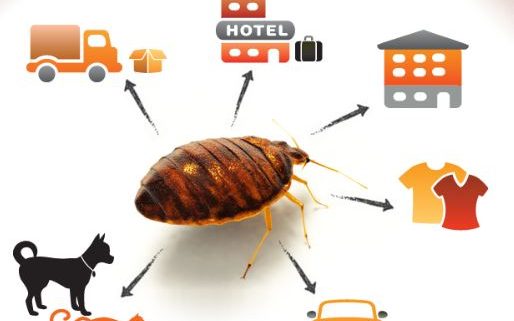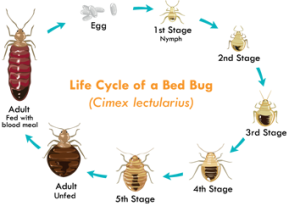Kings Cincinnati Bug Control Companies: Reliable Services
Kings Cincinnati Bug Control Companies: Reliable Services
Blog Article
Kinds of Parasite Control: Which Approach Is Right for Your Problem?
When encountered with an insect problem, the selection of an ideal method for pest control is essential in properly handling the scenario. By exploring the different kinds of insect control approaches available, individuals can make enlightened decisions tailored to their one-of-a-kind situations, making certain a more sustainable and reliable result in parasite removal.
Chemical Bug Control
Chemical parasite control involves using artificial or normally derived chemicals to handle and eradicate pest populations efficiently. This approach is commonly utilized in agriculture, forestry, and property setups to combat a variety of bugs, consisting of rats, weeds, and pests. Making use of chemical pesticides can offer quick and targeted options to pest problems, making it a preferred selection for many individuals and businesses.
One of the essential advantages of chemical insect control is its capability to quickly remove insects, reducing the risk of damages to crops, building, and human wellness. By making use of specific chemicals that target certain parasites, this approach can effectively regulate problems while decreasing injury to valuable microorganisms and the atmosphere when applied correctly.
However, using chemical bug control likewise increases concerns about possible negative impacts on non-target species, water resources, and human health. It is essential to follow safety and security standards, apply chemicals sensibly, and think about alternate pest control approaches to lessen these risks and ensure lasting insect monitoring methods.
Biological Parasite Control
Organic pest control, additionally understood as biocontrol, utilizes living microorganisms to manage and lower bug populations normally. This technique uses the power of nature to manage pests without the requirement for synthetic chemicals. Biocontrol can include the introduction of natural adversaries of the insect varieties, such as pathogens, killers, or bloodsuckers, to suppress bug populations. By utilizing the parasite's natural predators or virus, biological insect control supplies a lasting and environmentally pleasant service to pest management.

Mechanical Bug Control
Utilizing physical and manual techniques to manage parasite populaces, mechanical insect control supplies an alternate method that does not depend on using living organisms or artificial chemicals. This technique entails the usage of barriers, traps, or various other gadgets to physically hinder or get rid of pests. By obstructing pest entrance points or establishing traps to capture them, mechanical pest control can successfully reduce problems without introducing chemicals right into the setting.
One usual example of mechanical parasite control is making use of mesh displays on doors and home windows to avoid insects from going into buildings. This basic yet effective technique acts as a physical barrier, maintaining pests out while enabling correct ventilation. Furthermore, tools like mousetraps, fly swatters, and ultrasonic repellents drop under the mechanical insect control group.
While mechanical parasite control methods can be labor-intensive and need normal monitoring and maintenance, they use a lasting and eco pleasant remedy for handling pest infestations. By integrating various mechanical techniques, residential property proprietors can develop a detailed pest control method that decreases reliance on chemical pesticides.
Physical Pest Control

Some typical physical insect control approaches consist of using barriers such as displays or nets to stop bug entry, catches to capture and get rid of insects, and hand-picking to literally eliminate pests from plants or frameworks. Additionally, methods like heat treatments can be made use of to manage insects like bed bugs by elevating the temperature to degrees that are deadly to the pests.
Physical pest control is especially useful in integrated parasite management (IPM) strategies, where several parasite control methods are integrated for reliable insect administration while reducing using chemicals. By utilizing my company physical bug control strategies, individuals can properly address bug problems with minimal environmental effect.
Integrated Parasite Management
When executing physical bug control approaches as part of insect administration approaches, Integrated Pest Administration (IPM) arises as a comprehensive method that leverages numerous strategies to effectively control pest populaces. IPM concentrates on long-lasting avoidance of pests via a mix of organic, cultural, physical, and chemical devices customized to details parasite issues. By incorporating multiple control tactics, IPM aims to reduce the risks connected with insects while likewise minimizing dependence on chemical options.
One secret element of IPM is the emphasis on monitoring and evaluating pest populations to determine the most appropriate control techniques. This aggressive approach allows for very early treatment and targeted methods, causing more efficient effective pest control pest administration. Additionally, IPM promotes eco-friendly techniques by focusing on non-chemical control methods and only making use of chemicals as a last option.
Final Thought

By making use of the parasite's all-natural killers or pathogens, biological parasite control offers a lasting and ecologically friendly solution to pest monitoring. - Kings pest control Cincinnati
Using manual and physical methods to take care of parasite populaces, mechanical insect control provides an alternative approach that does not count on the usage of living organisms or artificial chemicals.A reliable technique to managing pest populaces without depending on chemical or biological you could look here approaches includes the use of physical parasite control methods.When executing physical pest control approaches as part of pest monitoring methods, Integrated Pest Monitoring (IPM) emerges as an extensive approach that leverages numerous techniques to properly manage pest populations. Chemical bug control involves the usage of pesticides, organic insect control makes use of natural killers, mechanical insect control entails physical barriers, physical parasite control includes capturing or removing bugs, and integrated bug management incorporates multiple techniques for a holistic technique to pest control.
Report this page